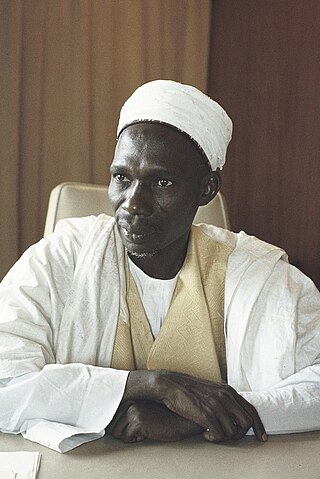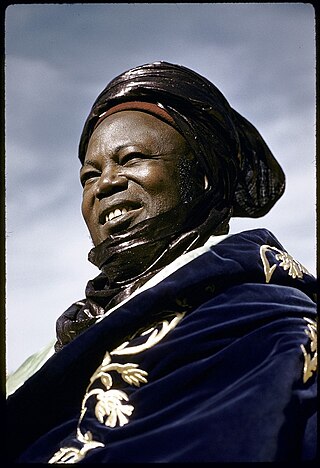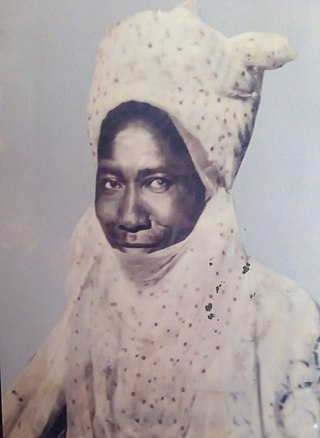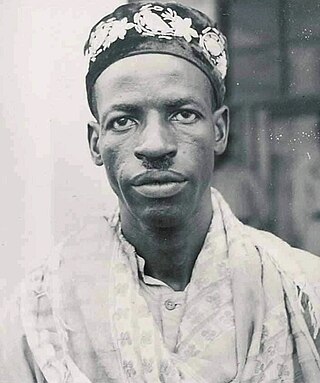
The People's Democratic Party is one of the two major contemporary political parties in Nigeria, along with its main rival, the All Progressives Congress.

Kano is a city in northern Nigeria and the capital of Kano State. It is the second largest city in Nigeria after Lagos, with over four million citizens living within 449 km2 (173 sq mi). Located in the savanna, south of the Sahel, Kano is a major route of the trans-Saharan trade, having been a trade and human settlement for millennia. It is the traditional state of the Dabo dynasty who have ruled as emirs over the city-state since the 19th century. Kano Emirate Council is the current traditional institution inside the city boundaries of Kano, and under the authority of the Government of Kano State.

Sir Abubakar Tafawa Balewa was a Nigerian politician who served as the first and only prime minister of Nigeria upon independence. A conservative Anglophile, he favoured maintaining close ties with the British. During his first few years in office as prime minister, Nigeria was a constitutional monarchy with Elizabeth II reigning as Queen of Nigeria, until Nigeria became a republic in 1963. He was both a defender of Northern special interests and an advocate of Nigerian reform and unity.

Ado Bayero CFR, LLD, JP was the Emir of Kano from 1963 to 2014.
The Lancaster House Conferences in London in 1957 and 1958 were meetings where the federal constitution for an independent Nigeria was prepared. The meetings were presided over by the British Colonial Secretary, and Nigerian delegates were selected to represent each region and to reflect various shades of opinion. The delegation was led by Abubakar Tafawa Balewa of the Northern People's Congress (NPC), and included party leaders Obafemi Awolowo of the Action Group, Nnamdi Azikiwe of the NCNC, Eyo Ita of the NIP, Ahmadu Bello and S. A. Ajayi of the NPC – as well as the premiers of the Western, Eastern, and Northern regions. The Chiefs of the Northern Region, Sir Muhammadu Sanusi, Emir of Kano and Alhaji Usman Nagogo, Emir of Katsina' Chiefs of the Western Region, Sir Adesoji Aderemi and Oba Aladesanmi; and Chiefs of the Eastern Region HRH Eze Johnson Osuji Njemanze MBE CON, Paramount Ruler of Owerri, Chief Nyong Essien of Uyo and Chief S. E. Onukogu

Sir Ahmadu Bello, famously known as Sardauna of Sokoto, was a conservative Nigerian statesman who was one of the leading northern politicians in 1960 and served as its first and only premier from 1954 until his assassination in 1966, in which capacity he dominated national affairs for over a decade.

Mohammed Rabi'u Musa Kwankwaso, FNSE FNIQS is a Nigerian politician who served as governor of Kano state from 1999 to 2003 and from 2011 to 2015. After he lost his re-election in 2003, he was appointed the first Minister of Defence of the Fourth Republic with no prior military background, from 2003 to 2007, under the administration of President Olusegun Obasanjo. He was later elected to the Senate in 2015, serving one term under the platform of the All Progressives Congress (APC) representing Kano Central Senatorial District.

The Fourth Republic is the current republican government of Nigeria. Since 1999, it has governed the country according to the fourth republican constitution. Nigeria adopted the constitution of the Fourth Republic on 29 May 1999.

The First Republic was the republican government of Nigeria between 1963 and 1966 governed by the first republican constitution. The country's government was based on a federal form of the Westminster system. The period between 1 October 1960, when the country gained its independence and 15 January 1966, when the first military coup d’état took place, is also generally referred to as the First Republic. The first Republic of Nigeria was ruled by different leaders representing their regions as premiers in a federation during this period.

Mallam Aminu Kano was a Nigerian radical opposition political leader, teacher, poet, playwright, and trade unionist from Kano. He played an active role during the transition from British colonial rule to independence, the First Republic, Military rule, and the Second Republic. Representing the Kano East constituency, he served as the Deputy Government Chief Whip in the Federal House of Representatives. During Yakubu Gowon's administration, he served as the Federal Commissioner for Communications and the Federal Commissioner for Health. He was a vocal critic of British colonialism and its indirect rule policy in northern Nigeria. A self-described democratic humanist and reformer, Aminu combined his knowledge of Western and Islamic education to champion the liberation of the talakawa (commoners).

Parliamentary elections were held in Nigeria on 30 December 1964, although they were not held until 18 March 1965 in some constituencies in Eastern Region, Lagos, and Mid-Western Region due to a boycott in December. The election saw most parties run as part of alliances, the Nigerian National Alliance and the United Progressive Grand Alliance.

Alhaji Sir Muhammadu Sanusi I KBE was the Acting Governor of Northern Nigeria (1957) and Emir of Kano from 1954 to 1963. He was the eldest son of Emir Abdullahi Bayero. He was a powerful Emir that had substantial influence in the colonial Northern Nigeria. He hosted a grand durbar festival for Elizabeth II when she visited Kano in 1956. The power tussle between him and his distant cousin Sir Ahmadu Bello the Sardauna of Sokoto and accusations of financial malfeasance led to his abdication, and subsequent self-exile in Azare 1963. His grandson, Sanusi Lamido Sanusi, former Governor of the Central Bank of Nigeria reigned as Emir of Kano from 2014 to 2020, was dethroned by the state government in 2020 then reinstated on 24th May 2024 by Governor Abba Kabir Yusuf. Sanusi belonged to the reformed Tijaniyya order of Ibrahim Niass.

The Northern Elements Progressive Union (NEPU) was the first political party in Northern Nigeria. Founded in Kano on 8 August 1950, it was the offshoot of a pre-existing political association called the Northern Elements Progressive Association. It became the main opposition party in Northern Nigeria after the region was granted self-governance in the 1950s. In the First Republic it maintained a steady alliance with Zikist National Council of Nigeria and the Cameroons (NCNC) against the Northern People's Congress (NPC)-dominated Federal Government.

The Kano Emirate Council is a traditional state in Northern Nigeria with headquarters in the city of Kano, the capital of the modern Kano State. Preceded by the Emirate of Kano, the council was formed in 1903 after the British pacification of the Sokoto Caliphate. The borders of the Emirate are contiguous with Kano State.

The Colonial history of Northern Nigeria extends from the British pacification campaigns to the independence of Northern Nigeria in 1953.

Abdullahi Umar Ganduje is a Nigerian politician who served as the governor of Kano State from 2015 to 2023. He previously served as Rabiu Kwankwaso's deputy governor twice, from 1999 to 2003 and from 2011 to 2015. He is a member and national chairman of the ruling Party All Progressives Congress (APC).
Alhaji Tanko Yakasai OFR is a Nigerian politician, human rights activist and former Liaison Officer to President Shehu Shagari. He is a founding member of Arewa Consultative Forum.
Amina Adamu Aliyu is a Nigerian judge from Kano State She was born in Kano Municipal Local Government Area of Kano State. She pursued her Bachelor of Laws at Ahmadu Bello University Zaria, graduating in 1986, and subsequently completed her legal training at the Nigerian Law School, being called to the bar in May 1989. Aliyu started her career as a state counsel in the Kano State Ministry of Justice in 1989, eventually rising to the position of Deputy Director Civil Litigation by 2009 when she became a High Court Judge. Notable cases include chairing the election petition tribunals in Kwara State in 2020 and Kebbi State in the 2019 Nigerian general election. Aliyu also presided over cases involving issues such as irregularities in the selection process of the Kano Emirate Throne and heinous crimes, delivering judgments that led to convictions and sentences.

Mallam Sa'adu Zungur was a Nigerian revolutionary, poet, jurist and nationalist who played an important role in Nigeria's independence movement particularly in Northern Nigeria. He is generally regarded as the father of 'radical politics' in Northern Nigeria. Zungur's political writings criticising the colonial government of Northern Nigeria, especially the emirate system, helped in laying the foundation for the principle of self-determination in Nigeria. His literary and political endeavors influenced a number of the leaders of the independence movement in Northern Nigeria, notably Aminu Kano and Isa Wali.















